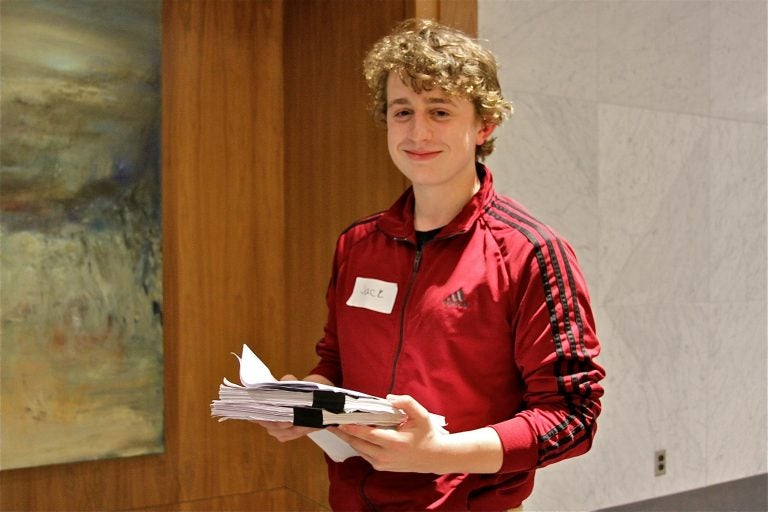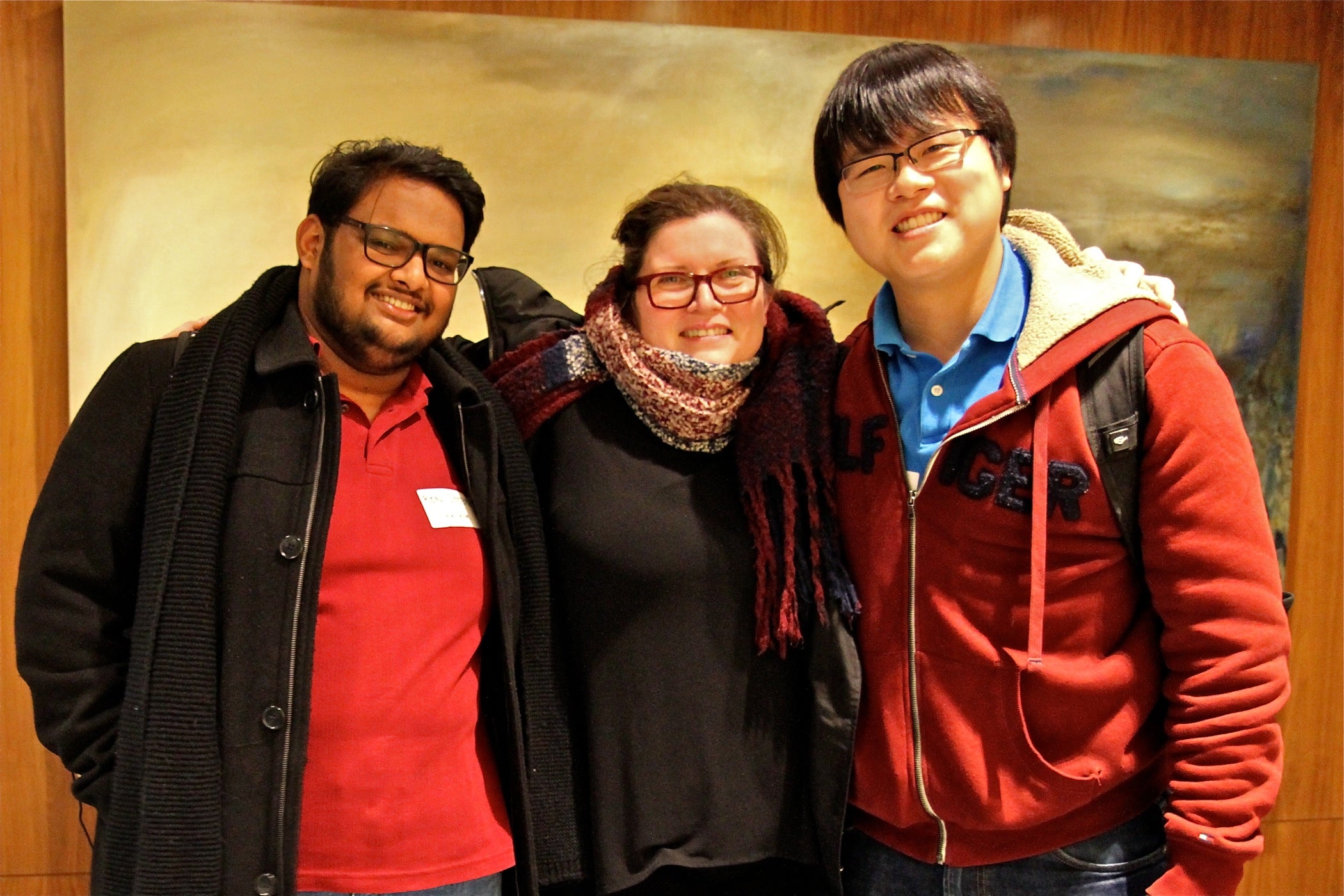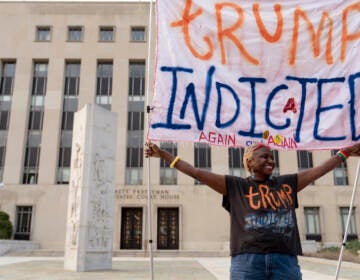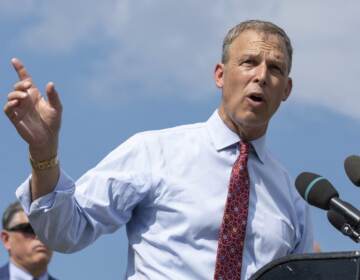Hoping to oust Trump, voters in Philly get ready to run for DNC delegates
The 2020 DNC in Milwaukee may feel a long way away, but voters throughout Philly and its suburbs are already planning how they’ll get there next July.

Jack DiPrimio, 17, from upper Darby, holds a draft of the PA democrat delegate selection plan. He hopes to become an Elizabeth Warren delegate. (Ximena Conde/WHYY)
The 2020 Democratic National Convention in Milwaukee may feel a long way away, but voters throughout Philadelphia and its suburbs are already planning how they’ll get there next July.
But first, they’ll have to file some paperwork and raise almost $3,000.
For people like 17-year-old Jack DiPrimio, the first step was to attend an education session Wednesday on how to run for a delegate spot in Pennsylvania’s April primary.
Delegates represent local support of their candidates at the convention. They make up a large portion of the crowd filling the convention centers — often decked in red, white and blue attire. They’re also the ones who help elect the Democratic nominee during the state-by-state delegate roll call.
“Conventions are historical,” DiPrimio said. “To be on the floor witnessing history is amazing. To think that, as a young person, I could see one of the next presidents of the United States nominated by their party … is incredible.”
Still, hopefuls and Philadelphia 3.0 organizers — who put the education event together in Center City — describe the delegate selection process as “funky.”
It’s also very different if you’re a regular voter, not a donor or leader in the Democratic Party (who are known as superdelegates).
Potential district-level delegates have to fill out a form declaring their support for their candidate by Jan. 28. Even though any voter can apply, campaigns give preference to the die-hard volunteers.
But the pathway to Milwaukee doesn’t stop with a green light from a campaign.
Once hopefuls get the ‘OK,’ they need to start campaigning for themselves and their candidates.
They need to pay a $25 fee to the Pennsylvania Department of State and garner 250 signatures from registered Democrats in their congressional district to make the primary balllot, though it’s suggested they get three times that number of signatures.
That’s because it gets their name out in the community as well as to their candidates, whose success is directly correlated to the delegate’s chances of heading to the Midwest.
If a candidate doesn’t get at least 15% of the votes in April, they’ll have no delegates to their name. If they garner 40% of the district’s vote, that’s the portion of delegates they get. The delegates that are part of the hypothetical 40% are chosen in the order they finished in the race.
For DiPrimio, the new year can’t come fast enough. He was one of several voters at the information session who hoped to help oust President Donald Trump from office — though many preferred to focus on what their candidate would do as commander in chief.
DiPrimio’s ready to put on his canvassing shoes to promote his candidate, U.S. Sen. Elizabeth Warren, and to warn people of the need to do something about climate change.
“Being one of the youngest people running as a delegate will definitely draw attention to the campaign,” he said. “Just talking to people, knocking on doors and asking them about issues they care about and as a young person hearing about those issues, maybe one day affecting change.”
He’s not the only one.

Kathryn Hiester, a 53-year-old mother of three in West Philly, is also ready to go to bat for her candidate and his plan to overhaul the American health care system.
“I’ve had a Bernie [Sanders] sign on my porch for five years,” she said.
In 2016, Hiester couldn’t run for delegate even when the DNC was in her own backyard. Her children were still too young. Instead, she volunteered in other ways, including housing a Sanders staffer during the convention.
“I desperately need Medicare for All,” Hiester said, who tallies her annual health care premium costs in the tens of thousands. “Not just for myself, but also for my children. We’re getting crushed with premiums every month and still there are things that we can’t cover with our insurance.”
But for people like Chris Desett, a 25-year-old gay man who lives in Center City, the chance to snag a delegate spot is more than the chance to talk about the issues he cares about the most, like depoliticizing the U.S. Supreme Court and scrapping the senate filibuster.
To become a delegate would be an opportunity to support South Bend, Indiana Mayor Pete Buttigieg, and do more than the “bare minimum” and go all in on the Democratic process.
“After Trump was elected… all I could do was march and shout and protest and cry,” Desett said. “I kind of see an opportunity this year … not just [to] support my candidate by canvassing. I want to do more.”
Many of the people looking to become delegates acknowledge that going to Milwaukee and staying in a hotel for the better part of a week is expensive. But they say the cost is worth it. Sanders and Warren supporters are already committing to helping their delegates, whoever they may be, fundraise.
This enthusiasm is welcomed by leaders in the Pennsylvania Democratic Party who push back on the idea that voting in the convention is symbolic. Sure, oftentimes the party already has a clear nominee after months of primaries and caucuses, said Brendan Welch, communications director of the Pennsylvania Democratic Party.
“The point is that these kinds of moments, they matter in a democracy,” he said. “We know who the president is going to be … on Election Day, but they’re not inaugurated until Jan. 20 and that’s the official moment when they take on that role.”
The same goes for the party’s nominee, Welch said. The convention will be the moment the eventual candidate introduces himself or herself to a large swath of the country.
“These moments matter in our democratic process,” Welch said.
Pennsylvania’s final number of delegates will be determined by the DNC by the beginning of next week. But the state is expected to get 100 to 125 district-level delegates. The number is based on the population, 2016 presidential election results and the 2018 gubernatorial election.
One major change this year is how superdelegates operate. Following complaints that the superdelegates yielded too much influence, the DNC made it so they can only cast their vote in extraordinary scenarios like a contested convention.
The Republican National Convention will be held in Charlotte, North Carolina in August 2020.
WHYY is your source for fact-based, in-depth journalism and information. As a nonprofit organization, we rely on financial support from readers like you. Please give today.





